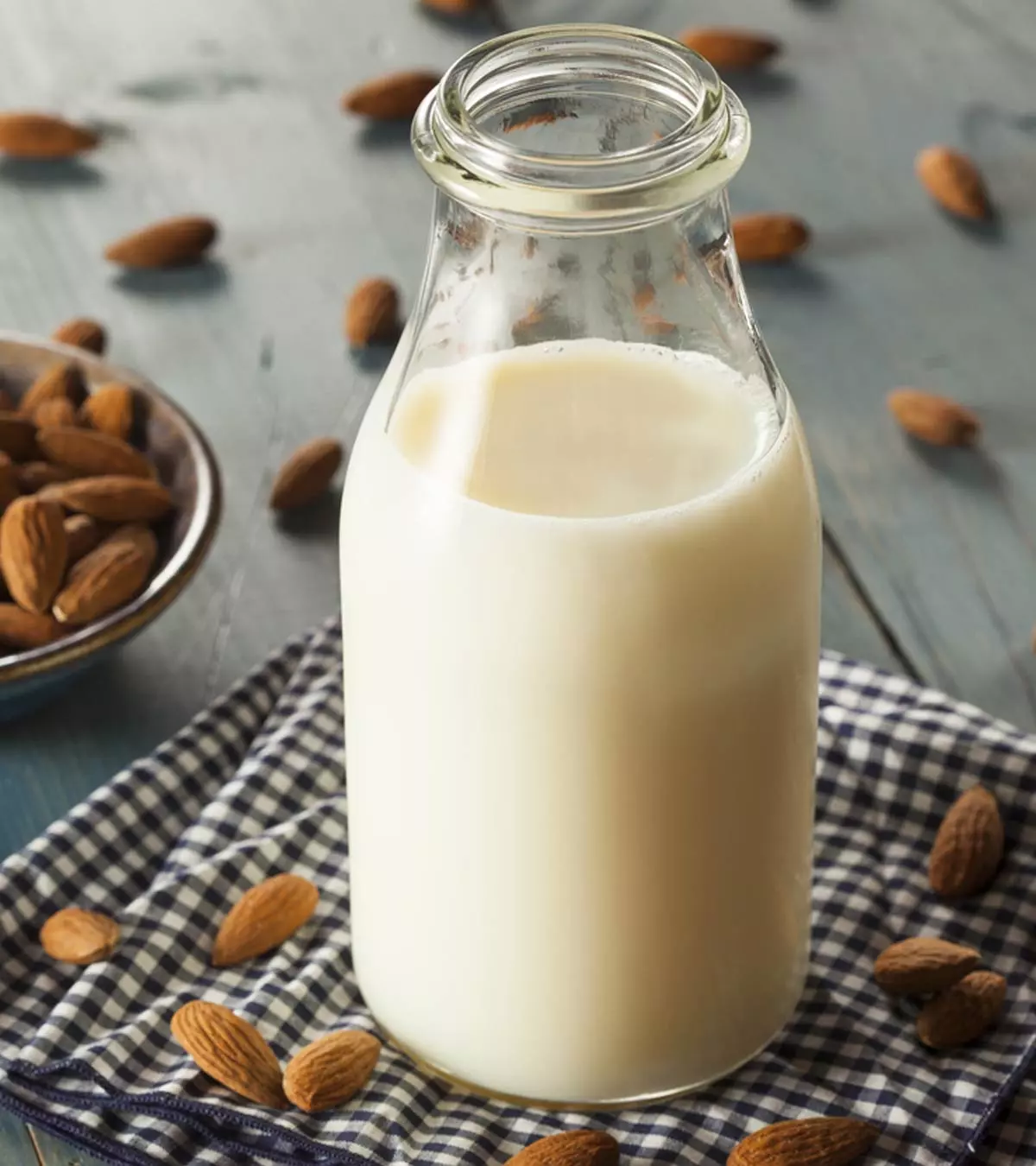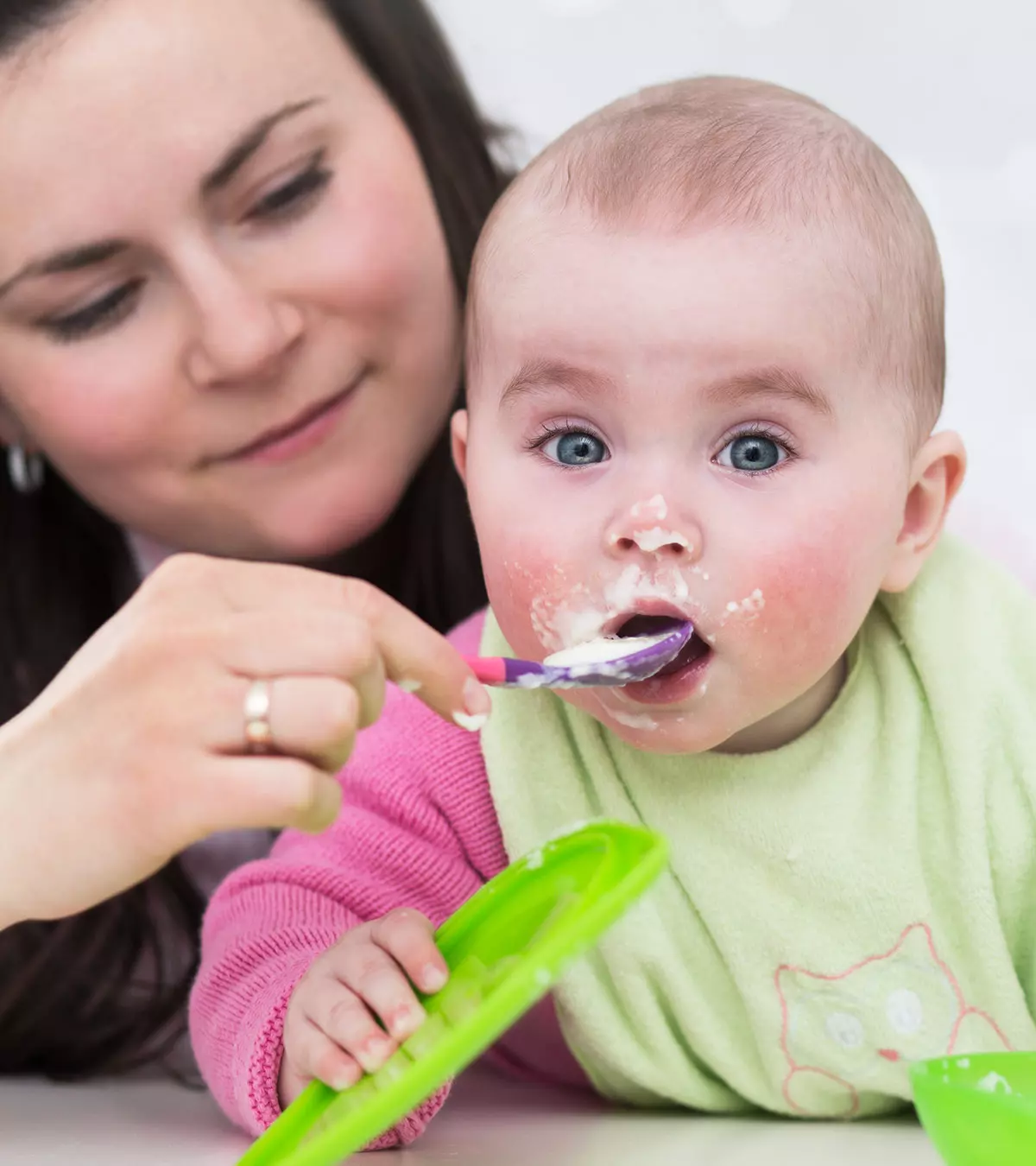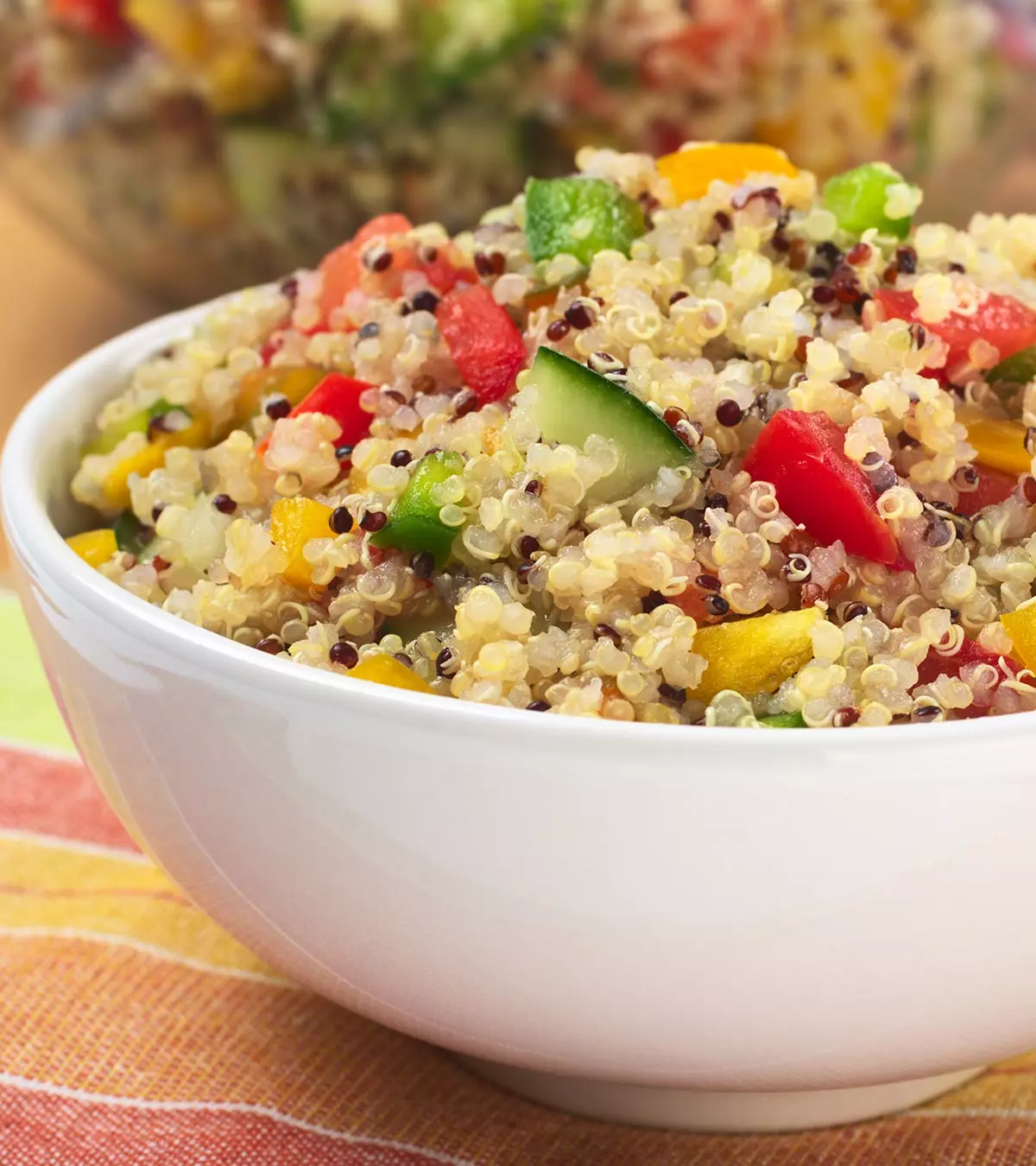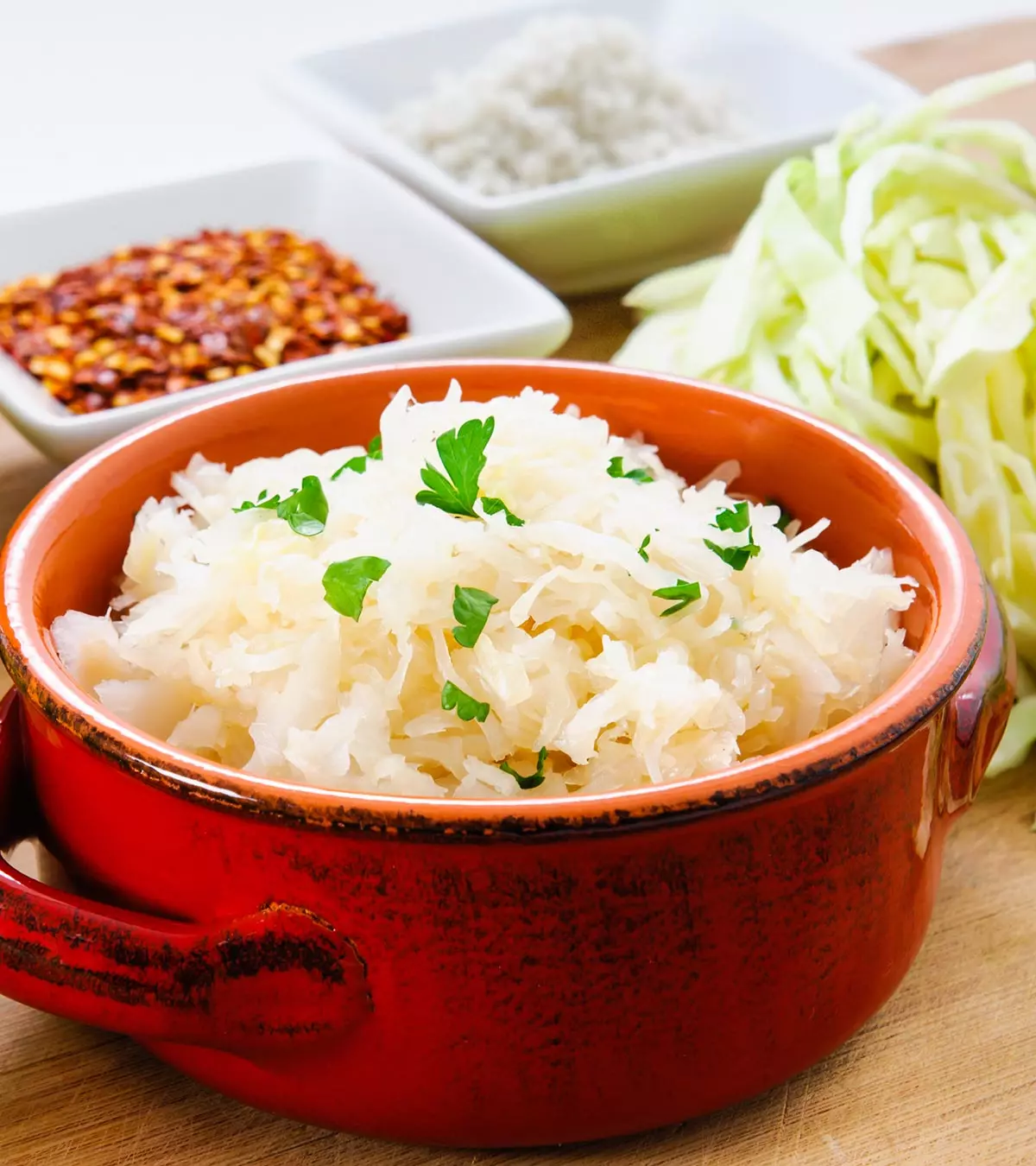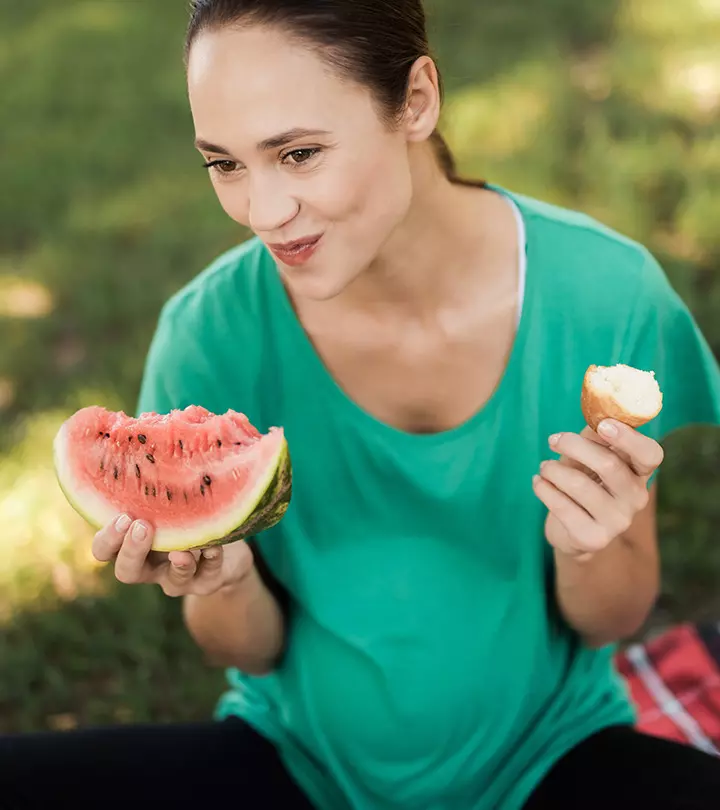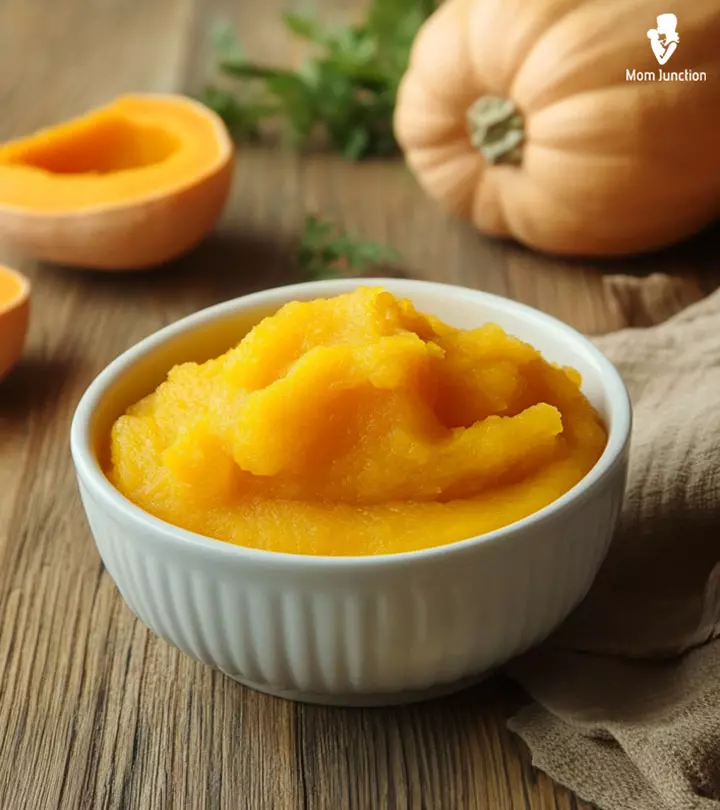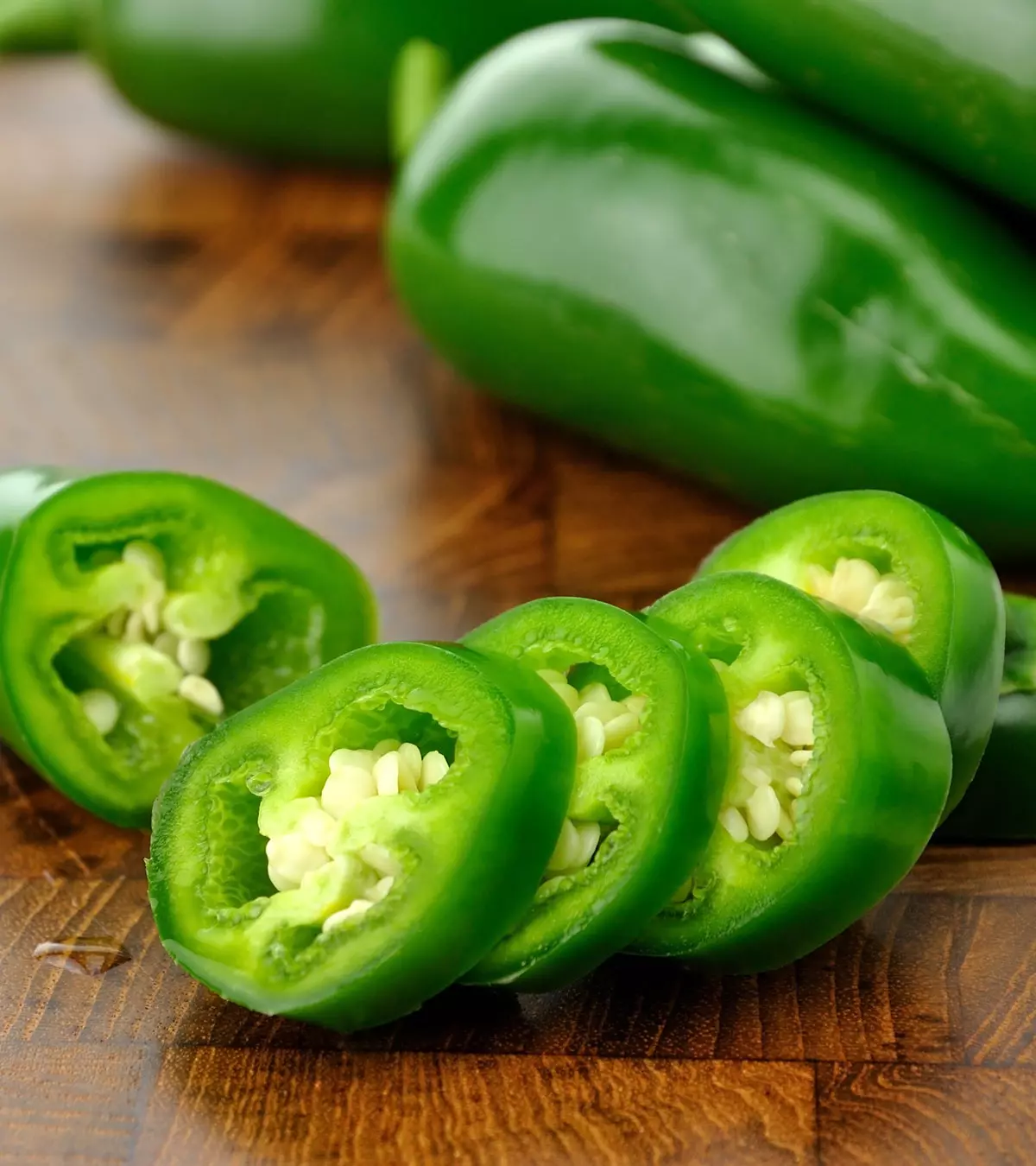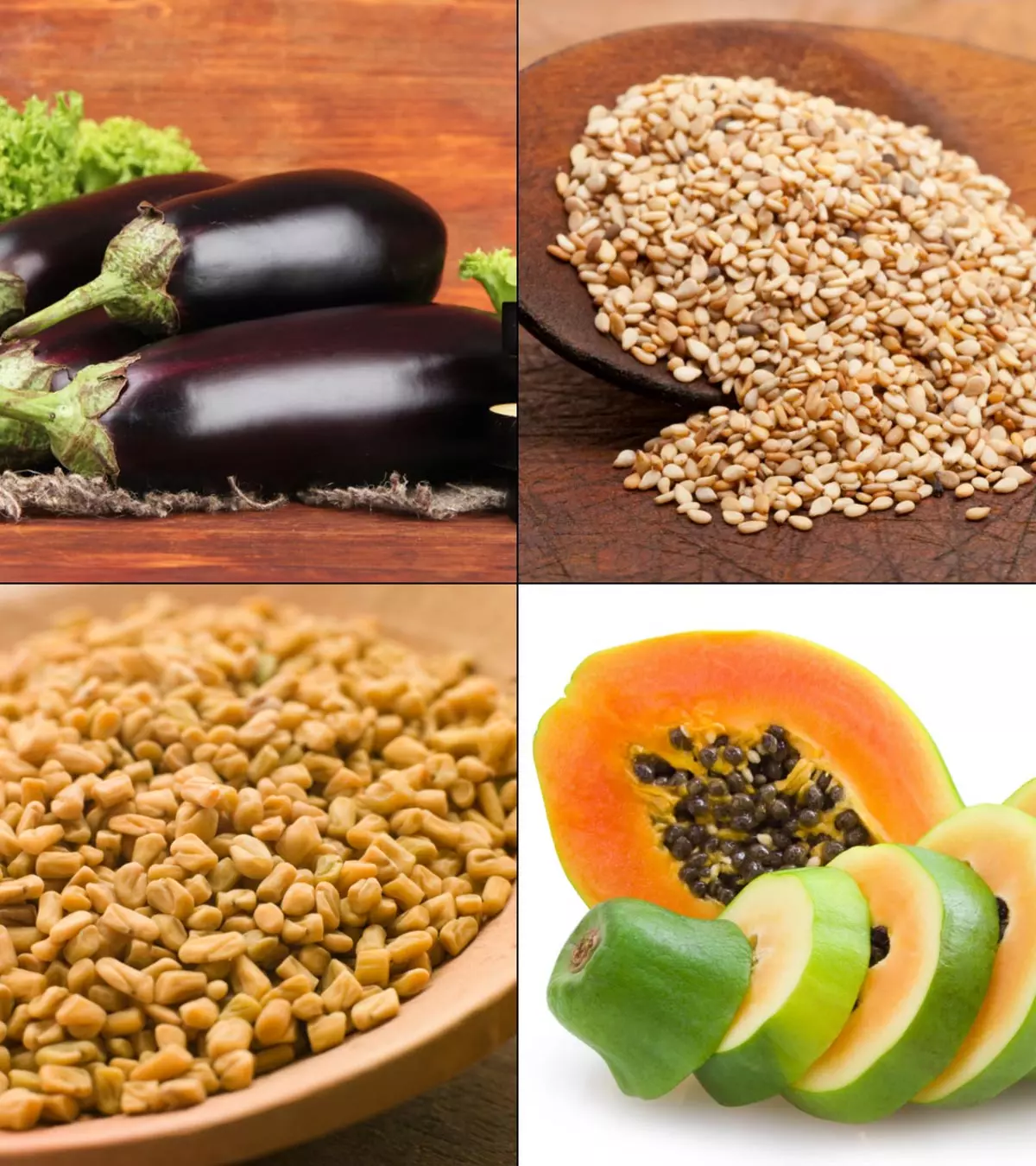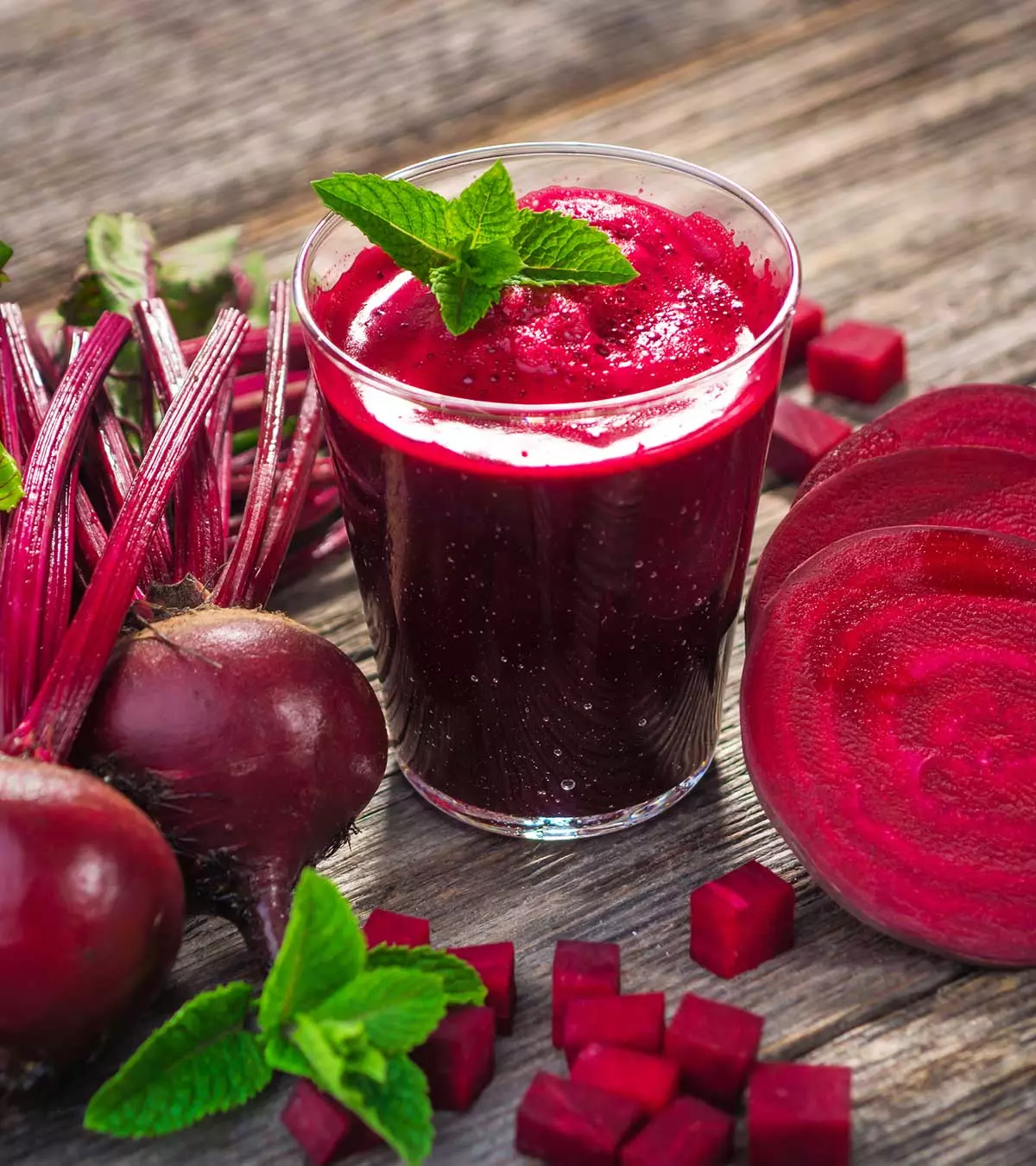
Image: istock
Consuming beetroot during pregnancy can satiate your craving, preventing the intake of high-calorie foods, such as sweets and cakes. Controlling sweet cravings in pregnancy can get tricky. However, you can manage your sweet tooth effectively by eating fruits and veggies in various forms. You may try beetroots, for instance.

Beetroots can offer dietary fiberiEdible parts of a plant that are resistant to digestion and several nutrients to contribute to your nutritional requirements. You can also use beetroot to make delicious curries, shakes, smoothies, and even desserts that you would love to relish.
But before you try it, learn if beetroot is a safe choice for pregnant women? Scroll down to learn more about the safety of beetroot for pregnant women, its possible health benefits, and its side effects.
Key Pointers
- Beetroot can be consumed by pregnant women in moderation (approximately two beetroots per day).
- It helps purify the blood, detoxify and revitalize the body, and is a source of dietary fiber and other vital nutrients.
- Beetroot is safe to consume during pregnancy, but excessive consumption might create digestive troubles and should be avoided in people prone to kidney stones or blood pressure irregularities.
- Beetroot can aid with birth defects, immunity, tooth decalcification, metabolism, joint aches, blood purification, anemia, healthy liver, fetal development, and digestion.
Can You Eat Beetroot During Pregnancy?
You may consume moderate amounts of beetroot during pregnancy. This comes up to around two beetroots a day. This red vegetable is known to have blood-purifying, detoxifying, and body-revitalizing properties and may be consumed raw, cooked, or juiced.
Kristin Gillespie, MS, LD, a registered dietitian and certified nutrition support clinician from Virginia Beach, Virginia, says, “Beets do not need to be avoided at any point during pregnancy, although you may need to limit your consumption if you are prone to kidney stonesiHard deposits in the kidneys formed by chemicals in the urine or blood pressure abnormalities.”
Nutritional Profile Of Beetroot
A 100 gram serving of raw beetroot might provide you the following nutrients that could help with your pregnancy needs (1).
| Nutrient | RDA (2)(3)(4) | Per 100g of beetroot |
|---|---|---|
| Total folate | 600μg | 109μg |
| Calcium | 1000mg | 16mg |
| Magnesium | 350-360mg (3) | 23mg |
| Potassium | 2900mg | 325mg |
| Iron | 27mg | 0.8mg |
| Dietary fiber | 28g (4) | 2.8g |
Health Benefits Of Beetroot Or Beetroot Juice During Pregnancy
Here is how eating beetroot during pregnancy might aid in the maintenance of prenatal health and the development of the baby:
- Birth defects: The horticulturists at the University of Wisconsin–Madison found that beets are among the foods with the highest folic acidiB vitamin that helps the body make new cells and prevent birth defects content (5). Including beetroot might help in the nervous system development of babies and could minimize the risks of birth anomalies such as spina bifidaiCondition affecting the spine that causes physical and intellectual disabilities .
- Immunity: The book Superfoods for pregnancy by Sussannah Marriott says that beetroot is known to have antioxidantiCompounds that inhibit oxidation and delay cell damage properties that could boost the immune system. Pregnant women require high immunity levels to steer clear of various ailments and infections.
- Decalcification of teethiWeakening of tooth enamel due to loss of calcium and phosphorus as a result of acidic bacteria : Beets have a good amount of silica, which enables the body to utilize minerals such as magnesium and copper (6). Along with it, it also has calcium and magnesium, which might help pregnant women deal with the decalcification of teeth.
- Metabolism: Beetroots provide potassium that might help balance the electrolytesiMinerals that help regulate nerve and muscle function . Also, it may help maintain blood pressure levels in expecting mothers (7).
- Joint pains and swelling: Beetroot contains trace amounts of betalain, which acts as a potent anti-inflammatoryiProperty of a drug or substance that reduces inflammation in the body agent (8). It is likely to avert pain and swelling in the joints (6).
- Blood purification: Beetroot has the ability to purify the blood (9), and could help prevent the risk of diseases and infections in the fetus. Consuming beetroot juice could boost your physical stamina and maintain blood pressure.
 Quick tip
Quick tip- Anemia: Beetroot contains iron that could boost the hemoglobin count in the blood (10). It might therefore help reduce the risk of anemia.
- Healthy liver: The book, Neal’s Yard Remedies Healing Foods, talks about beetroots’ liver cleansing properties. A group of antioxidants called betacyanins is likely to support this action.
- Fetal development: It’s important for pregnant women to make sure they get enough folic acid during their pregnancy. The current recommendations of the US Centers for Disease Control and Prevention are that pregnant women consume 4,000 mcg of folic acid daily starting one month before conception and continuing for the first three months of pregnancy. Consuming beets, which are rich in folic acid, can contribute to the optimal growth and development of the unborn baby (5).
- Digestion: The dietary fiber in beetroot could improve your digestive health (11) and aid in healthy bowel movement, thus managing constipation.
According to Johna Burdeos, a registered dietitian from Greater Houston, Texas, “Nitrates are known to help improve blood flow. As beets naturally contain nitrates, if consumed during pregnancy, they could help improve blood flow to the placenta. However, we need more studies to validate this.”
The vegetable could also result in a few side effects in some people.
Are There Any Side Effects Of Eating Beetroot During Pregnancy?
There could be some valid reasons for your doctor to have imposed dietary restrictions on the excessive consumption of beetroot. Some of the possible risks of having beetroot and its juice in excess during pregnancy are mentioned next.
- Beetroot contains betaine, which could cause nausea, vomiting, diarrhea, and gastrointestinal issues.
Burdeos suggests, “People with irritable bowel syndromei A condition affecting the digestive system that causes pain, diarrhea, etc. should be cautious when eating beets, as they can cause digestive issues.”
- High quantities of oxalate are known to cause kidney stones (12).
- The presence of nitrates may trigger fatigue (13).
- Might cause beeturia, a condition where urine and stools turn red (14).
To prevent nausea, gastrointestinal issues, and other side effects, consume beetroot in moderation and avoid eating it on an empty stomach. Consult your healthcare provider if you experience discomfort.
How To Eat Beetroot During Pregnancy?
Here is how you may include beetroot in your pregnancy diet.
- Slice them and combine them with other vegetables to make a salad.
- Bake along with other vegetables or eat them roasted.
- Boil beetroots and season them with salt and pepper to make a healthy dish.
- A juice or smoothie made of beetroots and carrots can be a great breakfast or evening beverage. A mother, Natasha, shares her recipe for a tasty beetroot smoothie she enjoyed during her pregnancy, “I take a small, boiled beet, two to three Medjool dates, eight oz almond milk, one scoop of vegan protein, one cup ice, and blend all ingredients together. This beet and date smoothie has become my go-to breakfast recently (i).”
- Grate the beetroot and add to the dough to make crunchy parathas or tortillas
 Quick tip
Quick tipKeep reading for a few beetroot recipes with easy cooking methods that you may try during pregnancy.
1. Beetroot powder
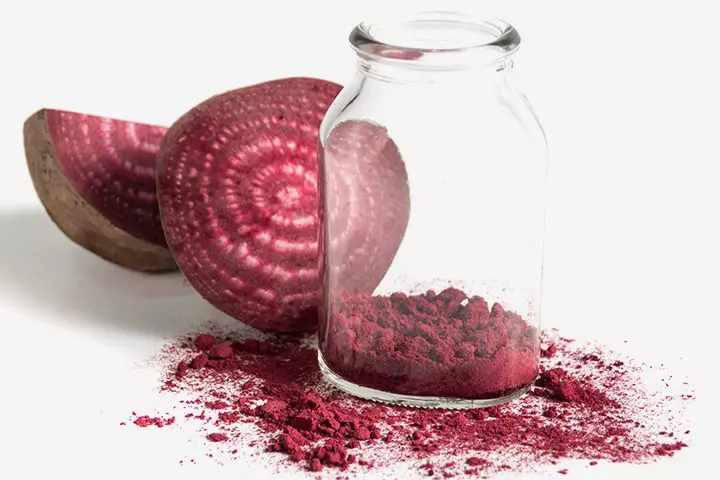
One to two teaspoons of homemade beetroot powder can be added to water or any juice.
You will need:
- One beetroot
How to make:
- Rinse and peel the fresh beets and cut it into thin slices. You may also use a food processor to slice it quickly.
- Allow the slices to dry in a food dehydrator or an oven on low heat, or sun-dry by covering with a net.
- Once they are completely dry, blend them in a grinder or a food processor.
- Store the powder in an airtight container to keep it fresh for an extended period.
Preparation time:
12hr 30min
2. Pickled beetroot
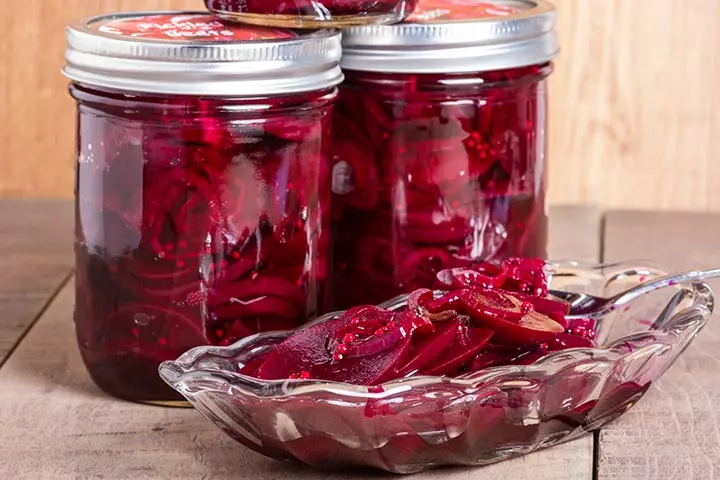
Pickled beets can be used as a snack, in salads or as a side dish with sandwiches or tortilla rolls.
You will need:
- 1lb beetroot (around six to seven small ones)
- ½ cup sugar
- ¼ cup white vinegar
- ½ tsp black peppercorns
- ¼ tsp salt
- 2 bay leaves
How to make:
- Remove the root and one-inch green stem from the beetroots and scrub them clean, to remove any dirt.
- Place them in a medium-sized saucepan and add water to boil them.
- Cover with a lid, simmer and let it remain for 45min until they turn tender.
- Remove the water and rinse using cold water. Allow to cool down.
- Peel the skin and slice them thinly into a large bowl.
- Make a vinaigrette by mixing vinegar, sugar, salt, peppercorns, and bay leaves in a separate saucepan.
- Pour vinaigrette over the sliced beets. Cover and marinate at room temperature for half an hour.
- Discard bay leaves and store in an airtight jar for later use.
Preparation time:
55min
Servings: 4
 Point to consider
Point to consider3. Easy beet greens recipe
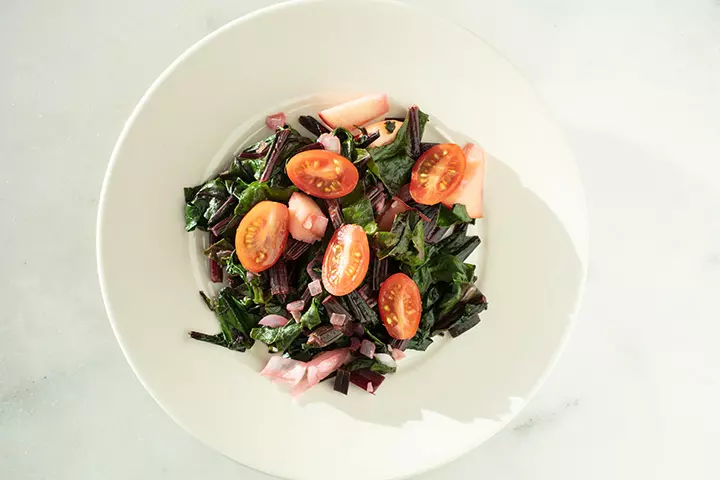
With a distinct and delicious taste, beetroot leaves have vitamin and mineral content. These leaves, with a good folate and vitamin A content, may prevent neural tube defects and facilitate healthy fetal growth (5).
You will need:
- 2 bunches of beetroot leaves
- 1tbsp olive oil
- 2 garlic cloves
- ½ tsp red pepper flakes
- Black pepper powder for taste
- Salt for taste
- 2 lemons
How to make:
- Boil salt water in a large pot. Add beetroot leaves and cook until tender, for two minutes.
- Drain the water and put the leaves in cold water. Once the leaves turn cold, remove them from the water and chop coarsely.
- In a large skillet, heat olive oil. Add garlic and red pepper flakes. Cook for one minute and add greens.
- Top with salt and pepper. Stir until hot and remove from flame.
- Eat with lemon wedges.
Preparation time:
20min
Servings: 4
4. Raw beet salad
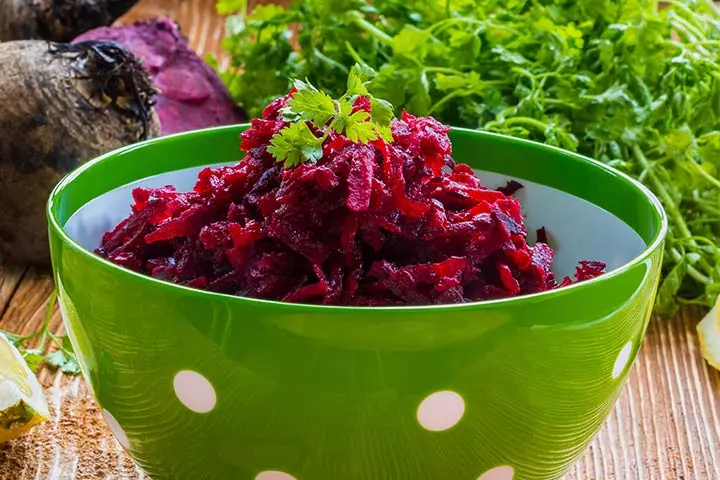
Beetroot salad makes a healthy and delicious snack or starter. Ensure you thoroughly clean beets before preparation, as raw vegetables during pregnancy may not always be safe.
You will need:
- 1lb beets (grated)
- 2tbsp balsamic vinegar
- 1tbsp extra-virgin olive oil
- 1tbsp fresh parsley (chopped)
- 1 garlic clove, minced
- 2tsp Dijon mustard
- ¼ tsp sea salt
- 1/8 tsp black pepper powder
How to make:
- Combine all the ingredients in a bowl and toss.
- Adjust the seasoning to suit your tastes.
- Serve fresh
Preparation time:
20min
Servings: 4
[Read: Eggplant (Brinjal) During Pregnancy]
5. Beetroot tea
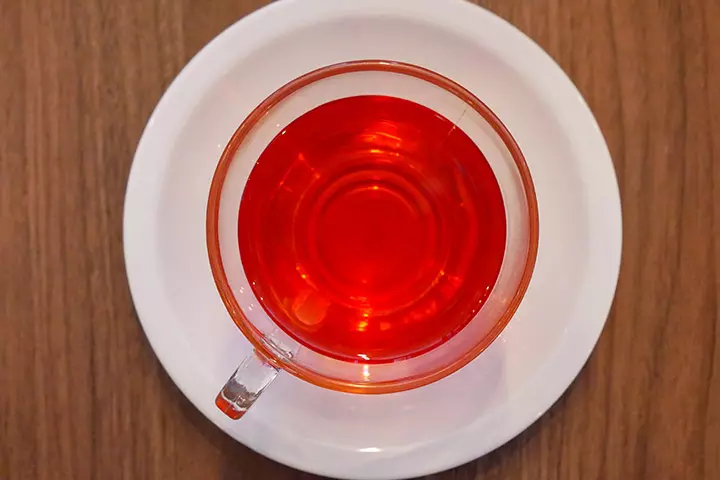
A unique caffeine-free tea you can make at home, beetroot tea has invigorating properties.
You will need:
- 1-quart water
- 4 beets, peeled and finely shredded
- ½ cup honey
- 2 lemons, freshly squeezed for juice
- 4 sprigs mint
How to make:
- Boil water in a saucepan.
- Add beets, lemon juice, and honey. Let it boil.
- Turn off the heat and let the mixture steep for about 20 minutes.
- Strain and serve with a sprig of mint and ice.
Preparation time:
20min
Servings: 8
6. Beetroot halwa
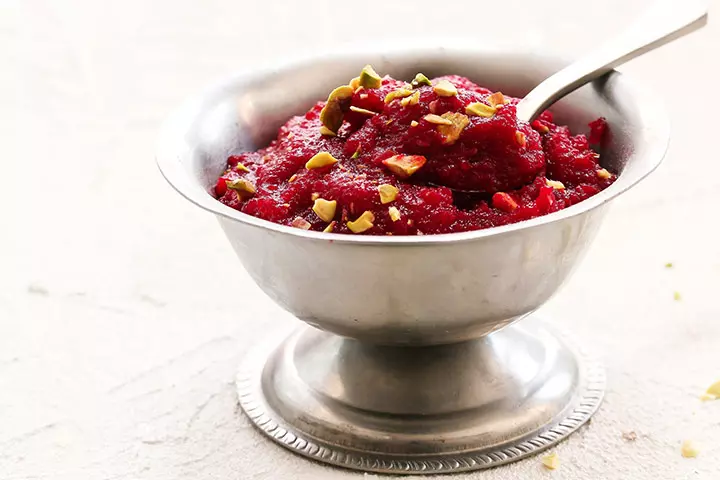
The halwa is an easy and healthy Indian dessert that you can try to beat your sweet cravings with.
You will need:
- 2 medium-sized beetroots
- 1tsp oil
- 1½ cup + ¼ cup water
- 2 tsp cornstarch
- ½ cup sugar
- 1/8 tsp cardamom powder
- Pinch of salt
- Nuts, chopped, for garnishing
How to make:
- Peel and grate the beets. Heat oil in a saucepan and add the grated beetroot.
- Sauté for about two to three minutes.
- Add 1½ cup of water, salt, and stir well. Cover and cook until the beets are cooked completely.
- Separately dissolve cornstarch in 1/4th cup water. Add this cornstarch solution to the cooked beetroot and mix properly.
- Add sugar, cardamom powder, and cook for another three minutes. Turn off the heat.
- Serve it warm by garnishing with chopped nuts
Preparation time:
20min
Servings: 4
Have more questions about eating beets while pregnant? Keep reading then.
[Read: Juices To Drink During Pregnancy]
Frequently Asked Questions
1. What are some precautions to take when consuming beetroot during pregnancy?
Pregnant women should wash beetroot thoroughly, and cook it properly. Beetroot should be consumed in moderation due to its high nitrate content, and can be harmful in excessive amounts.
2. Can beetroot help boost energy levels for expectant mothers?
Expectant mothers can include beetroot in their healthy diet. Beetroot contains iron, which is an essential nutrient for maintaining energy levels.
3. Are there any potential interactions between beetroot and other medications taken by pregnant women?
Limited evidence suggests no major negative implications of beetroot on pregnant women’s medication. However, potential interactions with phosphodiesterase-5 inhibitors and NO3/NO2 metabolism should be considered, as it may lead to hypotension. Further studies are needed to evaluate long-term efficacy and safety (18).
Eating beetroot during pregnancy is beneficial because it might help lower the risk of congenital abnormalities, enhance immunity, and prevent teeth decalcification. The vegetable also aids digestion and keeps the liver healthy. However, eating beetroots in excess may not be a good option because it may cause nausea, vomiting, and fatigue. So, if you decide on eating this nutritious vegetable during pregnancy, you should consult a doctor to know the right amount suitable for you. Under a doctor’s guidance, you may include beetroots in your diet in the form of soups, salads, and desserts.
Infographic: Health Benefits Of Beetroot During Pregnancy
Beetroots are a rich source of iron and folate that can provide ample benefits to an expecting mother and help her satiate her cravings. In the following infographic, we list the potential benefits of beetroot during pregnancy. Do give it a read and share it with your friends. Illustration: Momjunction Design Team
Illustration: Health Benefits Of Eating Beetroot During Pregnancy
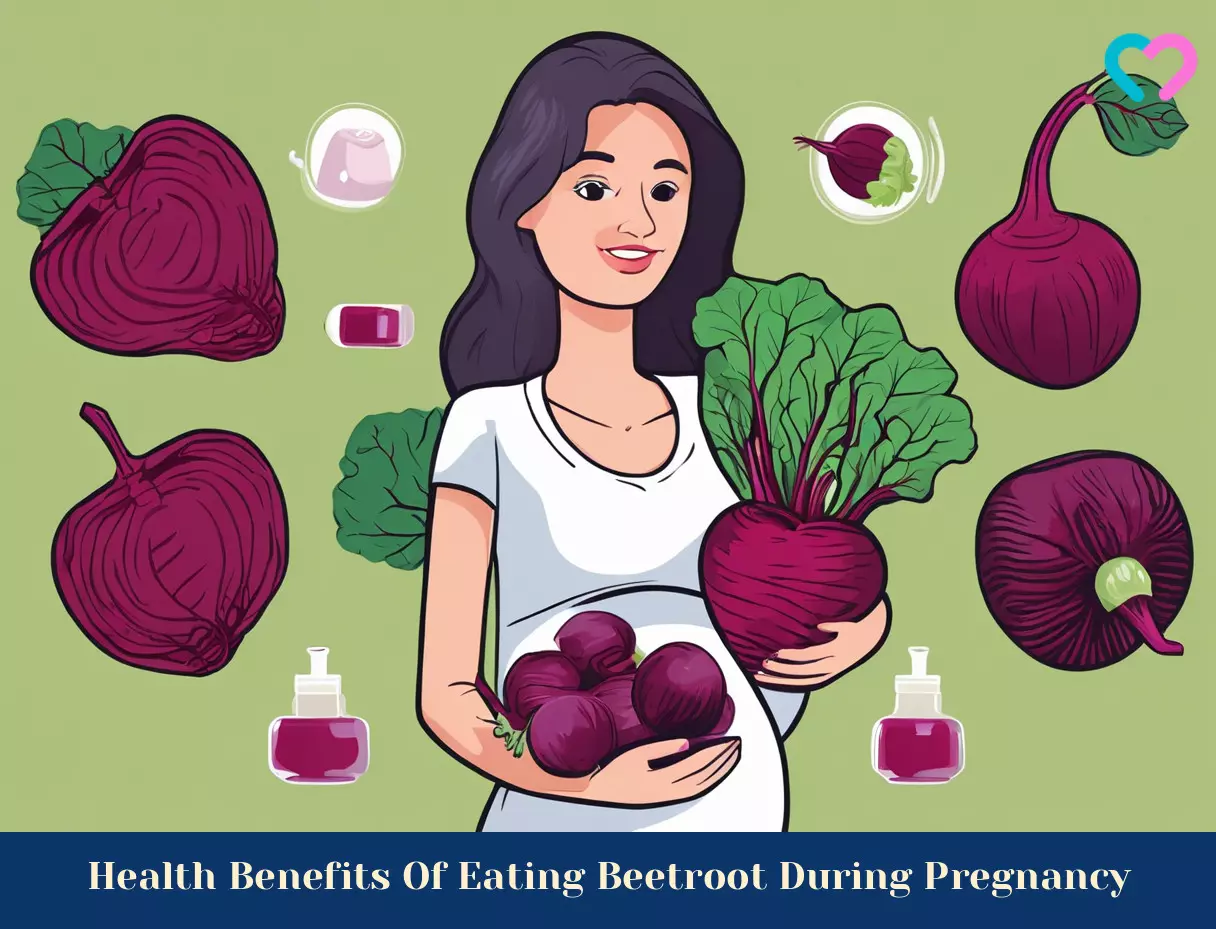
Image: Stable Diffusion/MomJunction Design Team
Beetroot is loaded with vitamins and minerals and possesses numerous health benefits but you may wonder if it is safe to consume during pregnancy. Look at this video to understand if beetroot is safe to consume during pregnancy.
Personal Experience: Source
MomJunction articles include first-hand experiences to provide you with better insights through real-life narratives. Here are the sources of personal accounts referenced in this article.
i. Beet and date smoothie;https://healthyandgourmet.blogspot.com/2018/01/beet-and-date-smoothie.html
References
1.Beets, raw;USDA
2. Michelle A. Kominiarek and Priya Rajan; Nutrition Recommendations in Pregnancy and Lactation; Med Clin North Am (2017)
3. Micronutrient Needs During Pregnancy and Lactation; Linus Pauling Institute | Oregon State University
4. Lisa S. Brown; Nutrition Requirements During Pregnancy; Jones And Bartlett Publishers
5. Scientists Get the Facts on Folic Acid in Red Beets; University of Wisconsin (1997)
6. Muhammad Ansar Farooq and Karl-Josef Dietz; Silicon as Versatile Player in Plant and Human Biology: Overlooked and Poorly Understood; Front Plant Sci. (2015)
7. Beets-Two Vegetables in One; University of Arkansas System
8. T Clifford, G Howatson, D J West, E J Stevenson; The Potential Benefits of Red Beetroot Supplementation in Health and Disease; Nutrients (2015)
9. Pushpaanjali. G, et al.; Effect of Beetroot Juice on Anaemic Patients -an Analytical Study; Bioscience Biotechnology Research Communications
10. Lizy Merlin Lisha; A Study To Evaluate The Effectiveness Of Beetroot Extract with Jaggery In Improving The Level Of Hemoglobin Among Late Adolescent Girls With Anemia; Pondicherry Journal of Nursing
11. Beets; New Entry Sustainable Farming Project
12. Avoiding kidney stones; Harvard Health Publishing
13. R Domínguez, J L Maté-Muñoz, Eduardo Cuenca, et al.; Effects of beetroot juice supplementation on intermittent high-intensity exercise efforts; Journal of the International Society of Sports Nutrition (2018)
14. Eastwood MA and Nyhlin H; Beeturia and colonic oxalic acid; QJM. (1995)
15. Beetroot juice can reduce blood pressure in pregnancy, but why do some women not respond?Tommy’s
16. Beet; USDA
17. Preserving Beets; PennState Extension
18. Functional properties of beetroot (Beta vulgaris) in management of cardio-metabolic diseases; PubMed Central
Community Experiences
Join the conversation and become a part of our nurturing community! Share your stories, experiences, and insights to connect with fellow parents.
Read full bio of Dr. Shikha Sharma
- Kristin is a registered dietitian and certified nutrition support clinician (from West Virginia University) based in Virginia Beach, VA, with ten years of experience. She is practicing as a nutrition manager for Option Care Health, Illinois, after earning a Master’s degree in human nutrition from Eastern Michigan university.
 Kristin is a registered dietitian and certified nutrition support clinician (from West Virginia University) based in Virginia Beach, VA, with ten years of experience. She is practicing as a nutrition manager for Option Care Health, Illinois, after earning a Master’s degree in human nutrition from Eastern Michigan university.
Kristin is a registered dietitian and certified nutrition support clinician (from West Virginia University) based in Virginia Beach, VA, with ten years of experience. She is practicing as a nutrition manager for Option Care Health, Illinois, after earning a Master’s degree in human nutrition from Eastern Michigan university. - Johna is a registered dietitian with 20 years of experience in clinical nutrition and outpatient nutrition counseling. She is also a freelance writer in the health and wellness space. Johna did her education at San Diego State University.
 Johna is a registered dietitian with 20 years of experience in clinical nutrition and outpatient nutrition counseling. She is also a freelance writer in the health and wellness space. Johna did her education at San Diego State University.
Johna is a registered dietitian with 20 years of experience in clinical nutrition and outpatient nutrition counseling. She is also a freelance writer in the health and wellness space. Johna did her education at San Diego State University.
Read full bio of Swati Patwal
Read full bio of Rebecca Malachi
Read full bio of Aneesha Amonz







